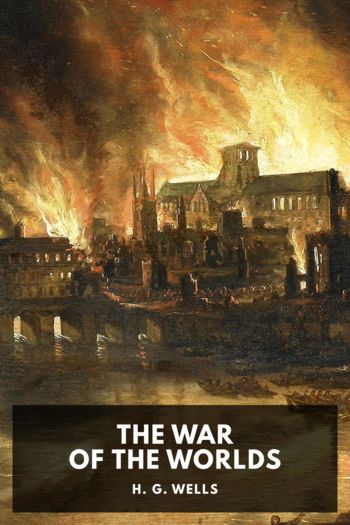The War of the Worlds - H. G. Wells (fun to read .TXT) 📗

- Author: H. G. Wells
Book online «The War of the Worlds - H. G. Wells (fun to read .TXT) 📗». Author H. G. Wells
On Wednesday the three fugitives—they had passed the night in a field of unripe wheat—reached Chelmsford, and there a body of the inhabitants, calling itself the Committee of Public Supply, seized the pony as provisions, and would give nothing in exchange for it but the promise of a share in it the next day. Here there were rumours of Martians at Epping, and news of the destruction of Waltham Abbey Powder Mills in a vain attempt to blow up one of the invaders.
People were watching for Martians here from the church towers. My brother, very luckily for him as it chanced, preferred to push on at once to the coast rather than wait for food, although all three of them were very hungry. By midday they passed through Tillingham, which, strangely enough, seemed to be quite silent and deserted, save for a few furtive plunderers hunting for food. Near Tillingham they suddenly came in sight of the sea, and the most amazing crowd of shipping of all sorts that it is possible to imagine.
For after the sailors could no longer come up the Thames, they came on to the Essex coast, to Harwich and Walton and Clacton, and afterwards to Foulness and Shoebury, to bring off the people. They lay in a huge sickle-shaped curve that vanished into mist at last towards the Naze. Close inshore was a multitude of fishing smacks—English, Scotch, French, Dutch, and Swedish; steam launches from the Thames, yachts, electric boats; and beyond were ships of large burden, a multitude of filthy colliers, trim merchantmen, cattle ships, passenger boats, petroleum tanks, ocean tramps, an old white transport even, neat white and grey liners from Southampton and Hamburg; and along the blue coast across the Blackwater my brother could make out dimly a dense swarm of boats chaffering with the people on the beach, a swarm which also extended up the Blackwater almost to Maldon.
About a couple of miles out lay an ironclad, very low in the water, almost, to my brother’s perception, like a waterlogged ship. This was the ram Thunder Child. It was the only warship in sight, but far away to the right over the smooth surface of the sea—for that day there was a dead calm—lay a serpent of black smoke to mark the next ironclads of the Channel Fleet, which hovered in an extended line, steam up and ready for action, across the Thames estuary during the course of the Martian conquest, vigilant and yet powerless to prevent it.
At the sight of the sea, Mrs. Elphinstone, in spite of the assurances of her sister-in-law, gave way to panic. She had never been out of England before, she would rather die than trust herself friendless in a foreign country, and so forth. She seemed, poor woman, to imagine that the French and the Martians might prove very similar. She had been growing increasingly hysterical, fearful, and depressed during the two days’ journeyings. Her great idea was to return to Stanmore. Things had been always well and safe at Stanmore. They would find George at Stanmore.
It was with the greatest difficulty they could get her down to the beach, where presently my brother succeeded in attracting the attention of some men on a paddle steamer from the Thames. They sent a boat and drove a bargain for thirty-six pounds for the three. The steamer was going, these men said, to Ostend.
It was about two o’clock when my brother, having paid their fares at the gangway, found himself safely aboard the steamboat with his charges. There was food aboard, albeit at exorbitant prices, and the three of them contrived to eat a meal on one of the seats forward.
There were already a couple of score of passengers aboard, some of whom had expended their last money in securing a passage, but the captain lay off the Blackwater until five in the afternoon, picking up passengers until the seated decks were even dangerously crowded. He would probably have remained longer had it not been for the sound of guns that began about that hour in the south. As if in answer, the ironclad seaward fired a small gun and hoisted a string of flags. A jet of smoke sprang out of her funnels.
Some of the passengers were of opinion that this firing came from Shoeburyness, until it was noticed that it was growing louder. At the same time, far away in the southeast the masts and upperworks of three ironclads rose one after the other out of the sea, beneath clouds of black smoke. But my brother’s attention speedily reverted to the distant firing in the south. He fancied he saw a column of smoke rising out of the distant grey haze.
The little steamer was already flapping her way eastward of the big crescent of shipping, and the low Essex coast was growing blue and hazy, when a Martian appeared, small and faint in the remote distance, advancing along the muddy coast from the direction of Foulness. At that the captain on the bridge swore at the top of his voice with fear and anger at his own delay, and the paddles seemed infected with his terror. Every soul aboard stood at the bulwarks or on the seats of the steamer and stared at that distant shape, higher than the trees or church towers inland, and advancing with a leisurely parody of a human stride.
It was the first Martian my brother had seen, and he stood, more amazed





Comments (0)